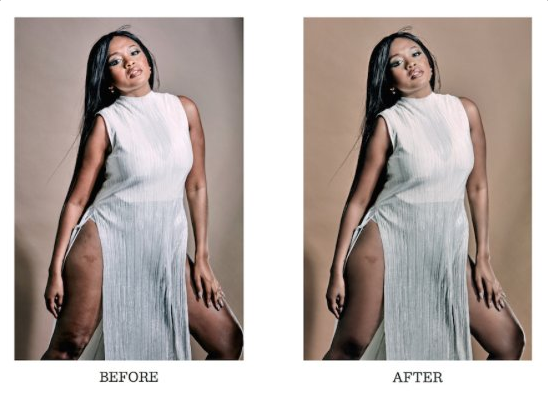Lerato Kganyago caught in Photoshop drama with True Love
Updated | By Poelano Malema

Local woman and beauty magazine True Love received a lot of backlash on Monday on Twitter after it released its latest cover featuring radio personality Lerato Kganyago. The magazine was criticised for touching up Kganyago to the point where she was “unrecognisable”.

The radio personality herself criticised the cover. "Nick Boulton is one of the most amazing photographers in the country. He captured me beautifully, it must be disheartening even for him to have his work continuously retouched (PhotoShopped) to a point of no recognition," she wrote on Instagram.
However, what left tweeps even more unimpressed was True Love’s response. The magazine hit back by releasing unedited before and after photos of the shoot, showing the star’s cellulite. It then wrote that it would never “intentionally do anything to compromise women”. “As a brand that stands for women empowerment, TRUE LOVE would never intentionally do anything to compromise women and their public profile. We have a responsibility not to tarnish our cover star’s image, to produce authentic content for our readers and to uphold the brand’s integrity,” it said on its website.

Celebrities such as Bonang Matheba and Terry Pheto showed support for Kganyago.
@leratokganyago we love you. We support you. This was meant to be a special moment for you!! Can't even imagine how hurt you are. ❤️
— Bonang B* Matheba (@bonang_m) May 23, 2016
YOU ARE BEAUTIFUL @leratokganyago
— Terry Pheto (@TerryPheto) May 23, 2016
Kganyago is not the first celebrity to be caught up in a photoshoot drama. In 2013, Maxim South Africa was also criticised for using too much Photoshop on model Lee-Ann Liebenberg in their October issue. In 2011, Julia Roberts’ ad was banned in the UK because the image had been altered too much
Show's Stories
-
Proof that children mirror what they see adults doing
This kid tries to drink water like a tequila shot...
The Workzone with Alex Jay 1 year, 10 months ago -
If you fail your driver's exam, don't do what this man did
A man who failed his driver's exam decided to hire a 'body double' to at...
The Workzone with Alex Jay 1 year, 10 months ago